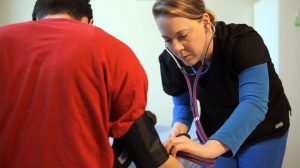Community
Substance use disorders are pervasive issues, impacting individuals’ physical and mental health and self-esteem, dividing and wearing on families, and significantly contributing to the rising cost of health care. The abuse of alcohol and other drugs is a factor in crime, domestic violence, and motor vehicle accidents.
One in four American employees report substance abuse in their family, and half of those note they are distracted and less productive at work because of their family member’s addiction. Substance abuse robs individuals, families, and the community of our full potential.
In 2015, The Bridge served more than 5,600 individuals in our various programs.
“The Bridge fills a large void in our community. If it wasn’t for their services, many highly intoxicated individuals may succumb to the elements, eventually get into a vehicle and drive off or inadvertently injure themselves by falling down or walking into the path of a motor vehicle.
The Bridge operates 24/7/365 days a year. If someone decides at 2 AM that they are ready to turn their life around and get some help for their addiction, they can do it. There is no other place in the City of Lincoln that offers this around-the-clock service.”
– Jim Peschong, Chief of Police
The Bridge Behavioral Health uniquely provides for our community:
- Treatment for uninsured and under-insured individuals with primary addiction diagnosis
- Medical Withdrawal Support for individuals without insurance or who have used their maximum insurance benefit
- Medical Withdrawal Support for individuals presenting to the emergency room but not meeting medical criteria for inpatient admission at the hospital
- A less expensive alternative to jail for dangerously intoxicated individuals without family support or financial resources
- Intervention and education in urgent situations through the co-location of Civil Protective Custody and Voluntary Medical Withdrawal programs
- Respite care for men and women with addiction and mental health concerns, whose treatment and recovery would otherwise be at risk
